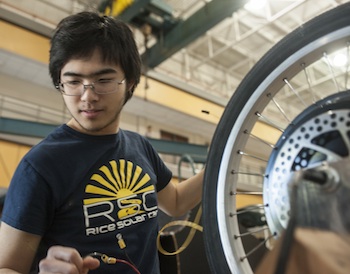Apr 18 2014
That could be the motto for the Rice Solar Car Club, which is preparing its entry for the Shell Eco-marathon in downtown Houston later this month.
 Zihe Huang, electrical lead on the Solar Car Team, makes an adjustment during construction of this year's vehicle in preparation for the Shell Eco-marathon. Photo by Jeff Fitlow
Zihe Huang, electrical lead on the Solar Car Team, makes an adjustment during construction of this year's vehicle in preparation for the Shell Eco-marathon. Photo by Jeff Fitlow
The team is racing to finish its efficient carbon-fiber vehicle in time for the national event, to be held April 25-27 at a temporary track around downtown Houston’s Discovery Green, near the George R. Brown Convention Center.
It will be Rice’s second appearance in the event. The Eco-marathon draws competitors from academic institutions all over the United States, Canada and Mexico, with a few entries from South America as well. In 2012, the first Rice team finished second in the prototype solar category.
Instead of rushing into another production cycle, the club decided to take a year to think about its next vehicle and started from scratch. The sleek new car is custom-molded from carbon fiber and fed power through a much smaller solar panel system than the first entry.
The car is technically more of a solar-assisted car, according to club president Juan Borbon, a Jones College junior majoring in mechanical engineering. “The first year, we had a huge array of solar cells, but the goal with this car is to have something more practical,” he said. “The competition limited the array size significantly.”
The solar panel, pre-built and packaged in Germany, supplies about 100 watts to the car’s battery pack and measures less than a square meter, said Zihe Huang, the team’s electrical lead and a Jones College senior. “The solar array is encapsulated with a film with a pyramid structure that allows it to use light that isn’t directly above the cell,” he said.
The carbon fiber body, the driver’s seat and elements of the chassis were painstakingly formed in huge polystyrene molds custom milled by a company in California and shipped to Rice, Borbon said. He expected the completed car to weigh between 300 and 400 pounds minus the driver.
Jones College junior Ben Lewis, who worked on the 2012 team and is likely to be one of the drivers, with Borbon, has confidence in the build quality. “Surprisingly, I’m not that concerned about my safety,” he said. “We took the seat out yesterday and I jumped on the chassis with all of my weight, and it was perfectly fine.”
The drivers will take their black beauty for time trials around a six-mile course, 10 laps around Discovery Green. The car will also be judged for efficiency.
This will be the last Eco-marathon in Houston, as the North American race will move to Detroit in 2015. Borbon couldn’t say for sure whether Rice will compete in future years, but said there are a number of competitions within reach of Houston. The solar car club is advised by Andrew Dick, an assistant professor of mechanical engineering.
Borbon and his colleagues on the 15-member team are also strategizing for Rice cars to come. “We’re thinking of pitching engineering teams to take on more components in future years,” said Borbon, who noted that one freshman design team is building accessories like side mirrors and wipers for this year’s edition.